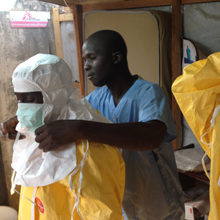Ebola outbreak in the Democratic Republic of Congo declared international health emergency
19 July 2019

The World Health Organization (WHO) has declared the Ebola epidemic in the Democratic Republic of Congo (DRC) a public health emergency of international concern (PHEIC), calling on the international community to provide additional funds and support to end the outbreak.
It follows confirmation of a case in the city Goma, a major transport hub on the border with Rwanda. The epidemic began a year ago and is now the second biggest outbreak ever, after the 2014-16 outbreak in West Africa.
Dr Derek Gatherer, Fellow of the Institute for Social Futures at Lancaster University said:
“The PHEIC is a declaration of war, once again, on Ebola. Like more conventional declarations of war, it may be followed by immediate action or a distinct lack of enthusiasm. Among the reasons why the latter may apply in this case is that many governments will be reluctant to send their medical staff, even if volunteers, into the midst of a long smouldering civil war.
“With seven murders, and over 50 serious injuries of health care workers so far in the current outbreak, and the failure of the UN peacekeepers over the last two decades to control a complex matrix of local hostilities, it seems unlikely that there will be anything approaching the West African intervention of 2014.
“On the positive side, the PHEIC may persuade governments to support increased volumes of vaccine production. Without the 160,000 doses of vaccine delivered so far in North Kivu and Ituri, we would have a far worse outbreak on our hands, perhaps one larger even than that seen in West Africa.
“WHO figures suggest 90% of contacts of cases are successfully traced and offered vaccination, but it is the 10% that go missing or are unreachable for security reasons, that present the real danger of persistent onward transmission. So far, we still have a ring vaccination strategy – contacts and contacts-of-contacts together produce lists of 100 or so candidate vaccines on average for each case. This strategy is designed for small outbreaks, and we are now approaching the situation where we may need to consider moving to a mass vaccination programme, especially in places like Goma. That will mean millions of doses of vaccine need to come off the assembly lines, and if the PHEIC galvanises government opinion to subsidise this, then it may achieve something positive in the very short term.
“Regarding transmission to a wider area of Africa or even internationally, there have been 75 million optical thermometer readings taken at official border points in the DRC over the last year. This is not 75 million different people, as many individuals make multiple crossings as part of their daily lives, but nevertheless it is a Herculean effort. Its success, so far, can be demonstrated in the 21 confirmed cases that have been intercepted following border temperature checks. So far, we’ve had one confirmed transmission to Uganda, but we could have had 21 more, and to several other countries. This shows how the outbreak really is potentially an international one.”
Further reading:
- Ebola in Democratic Republic of Congo ‘has the potential for rapid expansion'
- Ebola in West Africa
- The 2014 Ebola virus disease outbreak in West Africa
- Diagnosing and sequencing Ebola in Sierra Leone
- Accelerated clinical and technology trials in response to the Ebola virus epidemic
- Society members travel to Sierra Leone to help in the fight against Ebola
- The Facts About Ebola - Dr Ed Wright
- Comment: Ebola virus disease – a challenging situation
- Parliamentary Committee report exposes weaknesses in UK response to Ebola
Image: Ebola in Guinea flickr photo by EC/ECHO, shared under a Creative Commons (BY-NC-ND) license.
